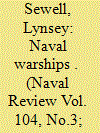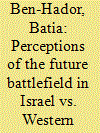| Srl | Item |
| 1 |
ID:
103298


|
|
|
|
|
| Publication |
2011.
|
| Summary/Abstract |
On 11 September 2010, the United States commemorated the ninth anniversary of the 9/11 attacks. In those nine years, British forces have been engaged in military operations of unexpected location, intensity, scale and duration. While the performance of British troops has been repeatedly praised on these operations, there has been growing disquiet among commentators and, indeed, among the military establishment itself about the conduct of these campaigns. Specifically, the issue of British military command has come under increasing scrutiny. This article examines command frictions at the strategic and operational levels and seeks to provide a sociological explanation of these difficulties. It claims that British commanders have failed to identify a coherent strategy over the past decade while in-theatre operational command has often been characterized by an ad hoc-ery, incoherence and inconsistency. The article suggests that a 'laissez faire' command culture has been evident at strategic and operational levels. While individual mistakes may not be irrelevant, the article explores the way in which this command culture may be a product of institutional pressures within defence and, above all, a product of inter-service rivalry. However, the laissez faire system of command in the armed forces may also be a reflection of much deeper cultural presumptions and preferences within British professional society itself which has always had a strong tendency towards pragmatism, decentralization and shorttermism. The article concludes by offering some suggestions as to how military command might be reformed in light of its potentially profound cultural origins.
|
|
|
|
|
|
|
|
|
|
|
|
|
|
|
|
| 2 |
ID:
150147


|
|
|
| 3 |
ID:
160947


|
|
|
|
|
| Summary/Abstract |
In the post-heroic era, features of warfare have dramatically changed in Western armies, but what about the future? This study focuses on the perceptions of commanders and experts from Israel versus those of commanders and experts from three Western countries (UK, Sweden and the US) regarding the challenges those armies will face in the future battlefield, at both the macro and micro level. This examination can lay a foundation for understanding the differences in the perceptions of the challenges that Israel and other countries are facing and to identify the major issues that must be considered in the discussion about the future battlefield. Most of the respondents found it difficult to anticipate the future. However, the Israeli narrative of the future was different from the narratives in the other countries. Qualitative analysis has exposed four factors of future battlefield perceptions: the characteristics of conflicts, macro-social factors, information and technology, and unit and command. In the Israeli context, complexity was perceived as a difficulty and even as a threat.
|
|
|
|
|
|
|
|
|
|
|
|
|
|
|
|